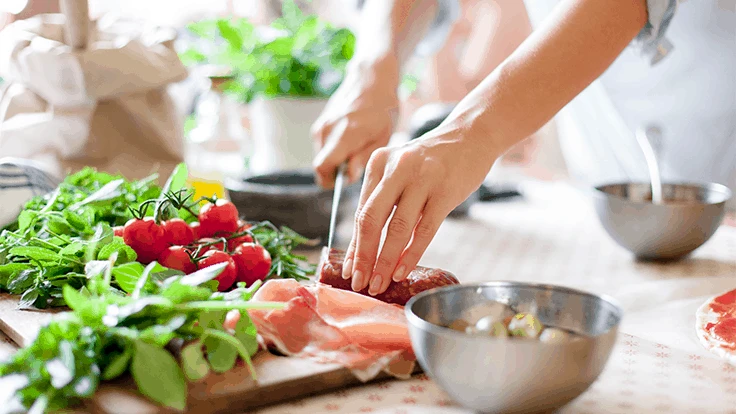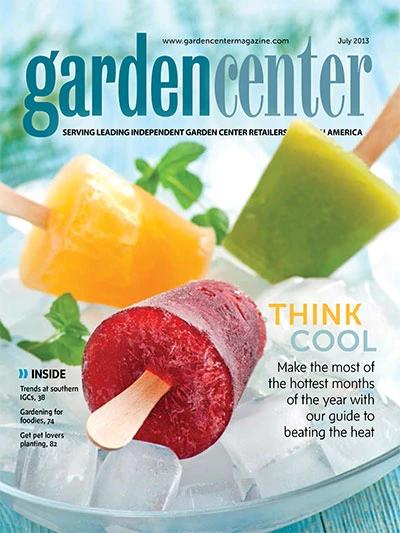
Marina Andrejchenko | Adobe Stock
 Rosemary is a staple in many at-home chefs' kitchens. |
The question
Believe it or not, there are some pretty useful industry-focused conversations happening over on Facebook, if you know where to look. An invitation only group I’m a member of called “Emergents: A Group for Growing Professionals” is exceptionally fruitful. One day, a cohort in the group asked this question:
“Food is exploding, even in horticulture. Consumers have three opportunities a day to learn about food. If they’re dedicated, they shop for plants 3 times a year. How do we increase the number of interactions with plants to monthly, or daily (even if it’s not at retail)?”
That would be Jonathan Bardzik, who happens to have a pretty fantastic blog called “What I Haven’t Cooked Yet” over on Wordpress. I thought it was a particularly insightful question and it tugged at me enough that I answered it:
“At the garden center I ran for the last eight years in Dallas, we connected a heavy year-round education schedule about edibles with participation from local chefs, restaurants and groups like Slow Food. We also provided supplies and education for backyard chickens, etc. Basically, there was no dividing line between the edible product we sold and the end-use by the end-user. We also had a lot of food contests, for example: Salsa Saturday that coincided with fall tomato transplants arriving, sponsored by a local restaurant and judged by local chefs...then we would put QR codes on the plant signage with links to the winning recipes. It was a highly successful approach. Our customers shopped edibles much more than three times per year on average.” This was just one example that came to mind that I thought could be a piece of the puzzle.
 Cooking with hot peppers has become much more popular recently. |
The answer
I think “connection” is really the key to answering Jonathan’s question. If we want to get our customers engaged in and excited by our products, we have to connect the dots for them. It’s just not good enough anymore to put the product on the shelf, then leave it up to the customer to figure out what to do with it. Today’s garden center shopper is an end-use, big-picture thinker… not a plant collector. And except for our boomer or older customers, their parents or grandparents didn’t teach them how to garden as a normal part of life. Our customers want the whole experience, and they want us to map it out for them.
Tell anyone you know these days that you’re growing basil, be they a boomer or a millennial, and I bet you’ll get something like this in response: “So what do you do with it…are you making your own pesto?” It just doesn’t make sense to today’s customer to grow things without a clear end-goal; I think that goes for ornamentals as well. Sure, a customer might possibly get excited because you have the newest dwarf variety of basil stocked at your garden center. More likely, they really just wanted any kind of basil and the miniature type happens to fit in that small container they have on their patio or balcony. Are they going to remember the name of the variety or brand? Doubtful. But, it’s not enough for them just to have the basil. Why do they have the basil? What are they supposed to do with it? THE hottest thing you can be right now is a chef, and it’s all about farm to table. “Real Foodies Grow Their Own” is a phrase I came up with while at North Haven Gardens. It’s become a much-used professional gardening mantra of mine. Our job is to make the part where you grow the food just as cool as being a culinary master. “If you want to make the connection with your customer, don’t just give them the plant: Give them the plant, show them how to grow it successfully and give them a recipe of what to make with it; then bring in a local chef to show them how to make it. Then give them an opportunity to come back to the garden center (or online) to show off their efforts! If you aren’t coming full circle with customers in this manner, then go ahead and assume most of your customers probably classify your garden center as “old fashioned” or “old school;” and I don’t mean that as a compliment.
Now, many will argue that there is no connection between being obsessed with food or cooking programs and an interest in plants. I’ll agree that is true for many non-gardening Americans. But I do see a very strong connection between food and gardening in IGC customers and those with a budding interest in gardening. For many newbie gardeners, creating homemade food and craft is their gateway to gardening, and we can’t ignore their initial motivations.
 |
But it’s more work…
You betchya it’s more work! You’ll have to work smarter and harder for your customer in order to make those connections for them. If your sales people think their job stops at stocking the tables, watering the plants and helping them into the customer’s cart (which frankly you’re lucky if you get that at most IGCs these days), then your staff needs a re-boot. Do they keep up with trends? Do they read gardening and cooking magazines? Do they keep up with fresh gardening and cooking blogs or better yet blog themselves? What are their favorite TV programs and do they include cooking shows? Do you ask these kinds of questions in your hiring interview? If not, you should start.
Have you set up edible demonstration beds at your garden center? If not, you’re missing out on a great opportunity for a large project sale. Most new vegetable gardeners have no clue how their raised bed should be filled or arranged. Show them and then provide them a shopping list and a planting map. Be sure they know when they can attend your next vegetable gardening 101 class, canning class or cooking demo. Then post the date for your chili cook-off, salsa contest or homemade cocktail happy hour. Coordinating not just the inventory needs, but also the education and cross-marketing efforts takes creativity, time, planning ahead and staff that buy in to your message.
 Set up an edibles demonstration at your garden center to show customers how to use their homegrown fruit, herbs and vegetables in the kitchen. |
Get local!
So, who do you get to teach the class on “cooking with fresh herbs” or “artisan garden fresh cocktails”? Chances are there is no one on your staff who can fit that bill… until of course you change up those interview questions! I’m a big proponent of cross-marketing with other local businesses, inside and outside of the industry. The best thing small businesses can do is support one another whilst sharing access to each other’s customer base. Now you have to reach out into your community and partner up with local restaurants and chefs, farmer’s markets, CSAs, wineries and anyone else whose product or services intersect with yours. Create events that provide a good PR opportunity for both of you and make sure to promote each other in your newsletters, ads and websites.
Public school gardens or mini-farms are another growing trend that can dramatically increase interactions with plants on a daily basis. IGCs need to jump on this trend fast and reach out to their local schools to offer support. I recently helped Moss Haven Elementary School in Dallas add a chicken coop and flock to their already growing school garden. If you’re really committed to training future generations of gardeners and customers, this is a no-brainer. By participating in a school garden, kids not only have those three times a day to learn about food, but they also interact with that food as it grows as part of their daily school curriculum. As the local IGC, sponsoring your local school garden, or even helping them build it, is a great way to make to make that food gardening connection early on for the kids and get their parents into your garden center.
Leslie Finical Halleck owns Halleck Horticultural, through which she provides horticultural marketing, business consulting, social media management and content generation for green industry businesses. Leslie is a Certified Professional Horticulturist (CPH) via ASHS, with more than 20 years of industry experience. For the past eight years she served as General Manager for North Haven Gardens, a well-respected independent garden center in Dallas, Texas. www.lesliehalleck.com

Explore the July 2013 Issue
Check out more from this issue and find your next story to read.
Latest from Garden Center
- America in Bloom announces 2026 program launch and celebrates 25 years of growing vibrant communities
- AmericanHort launches HortCred to advance skills development in the green industry
- Oasis Grower Solutions announces new northeast territory sales manager
- Amanda Solliday named senior manager of Sustainabloom
- New McCarthy-Family Flowers Legacy Fund supports multi-generational retail florists
- Monrovia releases new retail program, Landscape Legends, to mark 100th anniversary
- USDA to conduct 2025 Organic Survey
- Save the date for the 78th Santa Barbara International Orchid Show





